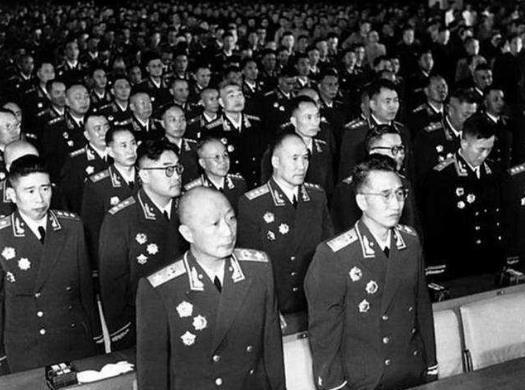In 1955, when the rank was awarded, the cadres at the level of the regular army general general generals generals generals were generals, and there were not a few who were rated as lieutenant generals, such as Qin Jiwei, commander of the 15th Army, Wu Xinquan, commander of the 39th Army, Wen Yucheng, commander of the 40th Army, Wu Ruilin, commander of the 42nd Army, and Wei Jie, commander of the 60th Army, who were all lieutenant generals. At most, cadres at the deputy military level can only be awarded major generals, and many people are awarded colonels. But there are always exceptions to everything, and in 1955 there were two special titles, a military commander was awarded only the rank of colonel, and a deputy military commander became a founding lieutenant general.

Yin Xianbing, commander of the 16th Volunteer Army, was awarded the rank of colonel. Yin Xianbing is a native of Hanchuan, Hubei Province, who joined the Red Army team at the age of less than 15, because there are too many red four fierce generals, Yin Xianbing rarely has the opportunity to stand alone, so the progress is not very fast, and there is not much reputation. After the outbreak of the War of Resistance Against Japanese Aggression, Yin Xianbing entered the 129th Division of the Eighth Route Army and repeatedly fought against the Japanese puppet army on the battlefield, accumulating rich combat experience. At the end of March 1940, Yin Xianbing, then deputy commander of the Jixi Guerrilla Corps, led his troops to completely annihilate more than 100 Japanese non-commissioned officer training teams at the Heishui River, making a name for themselves in the First World War.
Yin Xianbing
After the victory of the War of Resistance Against Japanese Aggression, Yin Xianbing participated in the Liberation War, followed the Erye Army from southwest Lu all the way to the great southwest, and was promoted to the commander of the 16th Army of the Erye 5th Corps by virtue of his military achievements, and the political commissar at that time was Wang Huiqiu, who later became the founding lieutenant general. After the outbreak of the War to Resist US Aggression and Aid Korea, Yin Xianbing repeatedly asked for war, but did not enter the DPRK until the end of 1952. At that time, the 16th Army led by him was the only composite unit in the volunteer army, and it was very well equipped to serve as the commander of the composite army, which showed the importance of Yin Xianbing by his superiors.
Third from the left in the back row is Yin Xianbing
Although he failed to catch up with the first five battles because of his late entry into the DPRK, Yin Xianbing's performance on the Korean battlefield was still remarkable. He joined the Red Army at the age of 15, served as a brigade commander of the newly organized 11th Brigade of the 129th Division during the War of Resistance Against Japanese Aggression, served as the commander of the 16th Army during the Liberation War, and participated in the War to Resist US Aggression and Aid Korea. However, because of his personal style, he was eventually awarded the rank of colonel. In 1983, Yin Xianbing died of illness at the age of 68.
Yang Xiushan, deputy commander of the 2nd Army, became the founding lieutenant general. Yang Xiushan, a native of Xiantao, Hubei Province, joined the Red Army at the age of 16 and participated in the Agrarian Revolutionary War, the Long March, the War of Resistance Against Japanese Aggression and the War of Liberation. During the Red Army period, Yang Xiushan successively served as the political commissar of the Red 11th Regiment, the political commissar of the Red 18th Regiment, and the deputy political commissar of the Red 4th Division, but until the end of the Liberation War, his position was that of the commander and political commissar of the 4th Division of the 2nd Army of Iino, that is to say, in the past ten years, he was only promoted to half a rank.
General Yang Xiushan
One of the main reasons why Yang Xiushan rose so slowly was that he fought too fiercely, and he was seriously injured in battle many times, and each time he was injured, he had to be nursed for a long time to get better. Although according to the battle merits, he should have been promoted a long time ago, but because he could not go to the post due to his injuries, and the chief officer of the unit could not be vacant for a long time, Yang Xiushan missed the promotion several times. This is an important reason why he was still a cadre at the division level until the end of the Liberation War.
General Yang Xiushan in his later years
After the founding of New China, Yang Xiushan was promoted half a rank to deputy commander of the 2nd Army, according to which he should be awarded the rank of major general. However, Yang Xiushan paid too much for the revolution, and was seriously injured 6 times, and a total of 21 pieces of shrapnel on his right leg and head could not be removed, but he still insisted on working with illness and endured unbearable pain for ordinary people. In recognition of Yang Xiushan's important contributions and dedication to the revolution, his superiors finally decided to award him the rank of lieutenant general by exception, and he became the only lieutenant general of the 177 founding lieutenant generals. In 2002, General Yang Xiushan died of illness at the age of 89.